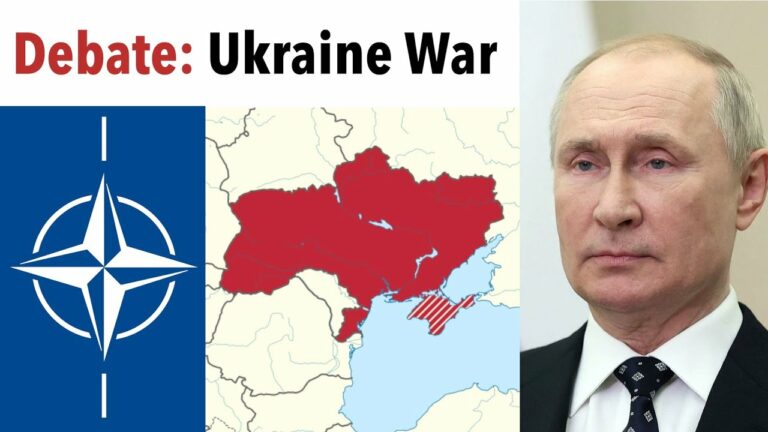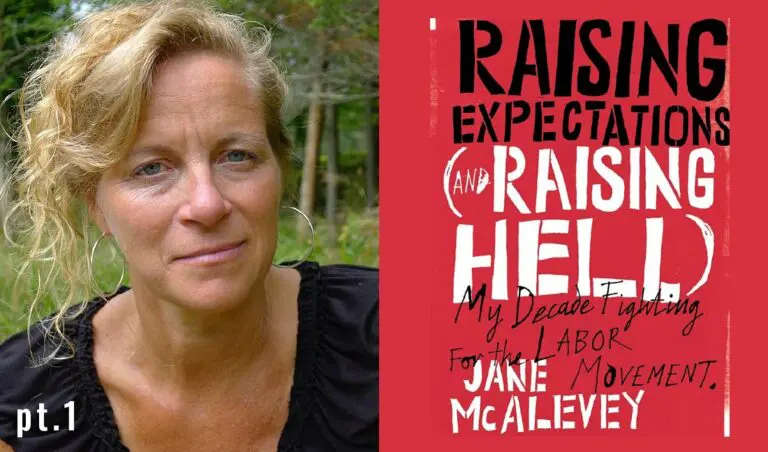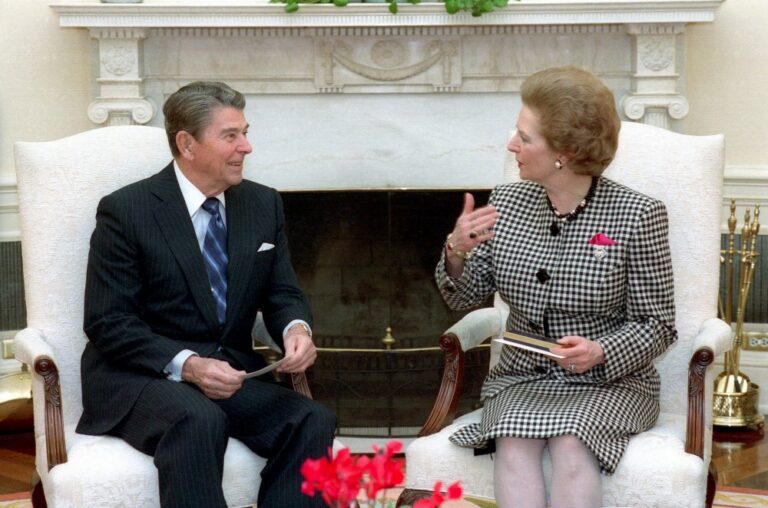On Reality Asserts Itself, Trita Parsi says the Israelis are trying to push the United States to reestablish the pre-Iraq War status quo, but it’s not possible any longer. This is an episode of Reality Asserts Itself, produced August 30, 2017, with Paul Jay.
STORY TRANSCRIPT
Paul Jay: Welcome back to Reality Asserts Itself on the Real News Network. I’m Paul Jay. We’re continuing our discussion about U.S. policy towards Iran. Trita Parsi joins us again in the studio. Trita is founder and president of the National Iranian American Council. His most recent book is Losing an Enemy: Obama, Iran and the Triumph of Diplomacy. Thanks for joining us again.
Trita Parsi: Thank you for having me.
Paul Jay: As I said at the end of the last segment, we’re going focus a bit on Israel’s role in all this. There’s a big campaign on now. Steve Bannon has been fired. He’s gone back to be executive chairman of Breitbart. Breitbart is now one of the largest news sites in the world. It’s been waging a big campaign against McMaster, a National Security Advisor, on the basis that he’s not militant enough and being pro-Israel, and he also isn’t militant enough about getting rid of the Iran agreement, the nuclear agreement, and such. While Bannon’s gone it seems like Trump shares those views and he’s certainly very close to the Saudis, but certainly shares those views, and seems so does Israel. What does Israel really want? There’s been some theory that Netanyahu has a lot of anti-Iranian rhetoric as an existential threat, but it’s more for domestic political consumption, or does he really want United States to go after in a far more aggressive way and really go after Iran?
Trita Parsi: I think those two things are not necessarily mutually exclusive. Iran has been a very valuable domestic political card for Netanyahu. There is really no opposition to Netanyahu within other parties in Israel in which they’re taking a dramatically different role, position on Iran. At best they would be criticizing Netanyahu and arguing that he has been reckless in the way that he’s handled the issue because he got himself into too much tensions with the Barack Obama administration. But to fundamentally disagree with Netanyahu’s position on Iran, you don’t find that within the political establishment in Israel.
Paul Jay: So in spite of the fact how many former intelligence Israeli leaders have said Iran’s not an existential threat-
Trita Parsi: Absolutely. When it’s the security establishment it’s one thing. When it comes to the political establishment it’s a very different picture. But they do all tend to agree that the deal at the end of the day, whether they agree or not, whether it’s good on the nuclear front, there is an agreement that it is unleashing Iran further in their view, that it is ultimately not helpful for the Israelis that the United States would adopt a position of seeking further negotiations with Iran on non-nuclear issues, to essentially accept Iran as a regional power. That is not something that is particularly popular in Israel and certainly not in Saudi Arabia. There are things that are really fascinating with the way the Netanyahu handled this whole thing. He committed numerous mistakes. One of the first and obvious mistakes is that he really pushed the idea that this is an existential threat and then combined that with demanding very, very unrealistic demands of the United States in any negotiation. Well, if you pursue positions on the nuclear talks that essentially rendered them impossible to succeed, and at the same time you say that a nuclear Iran is an existential threat, you’re essentially designing a chessboard that will make the U.S. confrontation with Iran inevitable, or at a minimum, make American action on Iran inevitable, because Netanyahu essentially eliminated the status quo option, the idea that The U.S. could just contain the nuclear program and then kick the can down the road and let it be the headache of the next administration. What Netanyahu miscalculated, however, is that yes by eliminating the status quo option you’re forcing the United States to take action, but take action does not automatically mean military action. It could also mean diplomatic action. That’s the route the Obama administration went, much to Netanyahu’s frustration. But had it not been for him eliminating the status quo option, there are good chances that the United States even under Obama would not have pursued these negotiations with the same intensity. It was precisely because of the threat that if we don’t resolve this issue we will end up either accepting nuclear in Iran or going to war. So Netanyahu, unfortunately from his perspective, actually pushed the United States in the direction that he didn’t want to. But moreover it was actually something even easier Netanyahu could’ve done to kill the deal. Instead of going out there and saying that this deal will pave Iran’s way to a nuclear weapon and blasting the United States every time the negotiations were extended, all he could’ve done that would have been far more effective in killing the deal was to go out and say this is a fantastic deal. This is great for Israel and this is Iran’s ultimate defeat. That would have created massive difficulties for the Iranian negotiating team. They had no problems dealing with Netanyahu’s criticism and saying, of this is so good for Iran; they actually used that to silence their critics inside of Iran, the hardliners. But if Netanyahu wanted to come out and hug the deal it would’ve created so much difficulty, the Iranian Foreign Minister told me himself, that he would have to pull out of the negotiations.
Paul Jay: The existence of Hezbollah in Lebanon, to have a military force that actually defeated the Israelis once, and is on the border … I can’t see … I’ve been there. I’ve talked to Hezbollah. I do not see how Hezbollah is any kind of a threat to Israel’s existence, that Hezbollah’s not going to go on the offensive against the Israeli military, but they don’t like the fact that there’s a territory there with a military they can’t … Is that not one of the most important factors in terms of why Israel is so antagonistic to Iran?
Trita Parsi: It certainly is one very, very important factor. The Iranians have, despite the fact that they don’t have nuclear weapons, they nevertheless have a very strong deterrence against Israel, which does have nuclear weapons. That is primarily through Hezbollah. We saw that in 2006, that despite Israel’s complete military superiority it still actually could defeat Hezbollah after 34 days of warfare, including a land invasion of southern Lebanon. That really proved that the value to the Iranians at Hezbollah gave them, by being able to be such a strong deterrence against Israel. This is not about existential issues. It is about the pre-2003 Israel enjoyed a very strong maneuverability in the region. The Iranians were checkmated by Iraq in Afghanistan. The U.S. was imposing and ordering the region based Iraq and Iran’s isolation. All of that went up in the air because of the invasion of Iraq and because of the failure of the United States in Iraq. The Israelis have been desperate and trying to push the United States to reestablish the pre-2003 status quo. It’s just not possible any longer. The United States neither has the capacity to do so, and even if it did, it’s not clear whether that would be sustainable or whether that really would be valuable. It’s not difficult to understand a desire from the Israeli side, and particularly from the Saudis. If you could have an option of having a superpower essentially create stability for you and you living safely under their umbrella enjoying the type of maneuverability that your own power never would allow you to do, it’s not unreasonable that one would pursue that option. But the United States increasingly cannot afford to provide that umbrella and it increasingly does not make sense for the United States from the global perspective to put so much focus on the Middle East and so little focus in Asia.
Paul Jay: Again-
Trita Parsi: I would still-
Paul Jay: The foreign policy establishment think this way, but not the Cheney-esque view of the world.
Trita Parsi: Certainly, sure.
Paul Jay: I think these Trump guys are picking up where Cheney left off.
Trita Parsi: Trump himself I frankly don’t think understands any of this. I haven’t seen any indication that he has any understanding of geopolitics, but definitely within the circle of people around him you have people would be more neoconservative, but there’s other elements as well. A lot of the people, particularly military people that have been in the NSC, whether before or after McMaster, had some of their formative years either in Afghanistan or in Iraq. They strongly feel that both Bush and Obama were not forceful enough against the Iranians. They feel that if the United States had used more force the Iranians would’ve backed down. Their argument is that there is the possibility and there’s a value for a small war with the Iranians, and that if the United Sates just really shows its military superiority the Iranians will back down.
Paul Jay: These are the John Boltons of the world.
Trita Parsi: Bolton would probably be more … These are people that we otherwise would not necessarily say are in the bad end or category, but nevertheless, feel strongly about this, because-
Paul Jay: Washington Post editorial- I read earlier. They’re practically educating them.
Trita Parsi: It’s much more of an essentialist view rather than a neoconservative view. I personally don’t think it will work. I don’t see any historic examples in which the United States taking strong military action, even if in a contained way, actually dramatically transformed the U.S./Iran rivalry or amenity. Rather what it tended to do is get the Iranians to back off from one specific area only to ramp things up in a different arena. They’re fighting an isometric struggle against a much more powerful enemy of the United States. So the idea that there could be a small contained war, I think is quite foolish. But right now it doesn’t seem as if there’re any people around Trump that would explain to him that if you take these various actions against the nuclear deal, it could lead to a military confrontation, whether big or small. The circle of people around him, even with Bannon and others gone, seem to only stretch itself from people who say, “Let’s just kill this deal right away and confront the Iranians very aggressively in the region,” to those who say, “Let’s wait a little bit. Let’s destroy this deal in a more sophisticated way so that we can shift the blame onto the Iranians.” Really we don’t see anyone that is telling Trump, “This deal is working. This thing is making sure that there isn’t any path for Iran to go for a nuclear weapon.” That’s a very, very positive thing. Even if there may be people in the administration that actually believe that and feel that, I doubt that they see any value for them to raise that point with Trump, now when he seems to have his mind so set when it comes to destroying the deal. It’s not so much whether the deal works or not; it’s about the fact that this is Obama’s deal, and he’s just obsessively going against everything Obama achieved.
Paul Jay: There’s some underlying forces here. Almost war is extremely profitable. Arms sales are going through the roof. I mean, you can’t even talk about it. The military budget … Trump wanted $54 billion and the military industrial complex complained it wasn’t enough; in fact it wasn’t that much more they said than Obama was promising, and Congress is upping it by another $15-20 billion. The volatility is wonderful if they can really get something started with Iran. What happens to the price of oil is likely to go up, at least for a while. Volatility is great. If you’re in the fossil fuel sector, it’s great. It’s even great in the finance sector if you know it’s coming, because you can play it. Of course, the military industrial complex is loving every minute of this. We interviewed Larry Wilkerson a lot. He has said, Do not underestimate how such banal motivations drive foreign policy. Like just pure moneymaking. There’s a lot of geopolitical thinkers and there’s a lot of planning about China and about global strategy, but a lot of decisions are just made on how much money will this make us this week and next week.
Trita Parsi: I think in particular with this administration that latter component is much greater. I think we have seen that there’s been a whole set of various influencers when it comes to decisions of this kind, and geopolitical considerations are one perhaps the main ones under normal circumstances, but there are other considerations as well. Right now in an administration in which to President himself doesn’t seem to understand even 101 geopolitics, to others who seem to be rather obsessed with revenge against Iran, and we see that particularly in some of the folks in the NSC, it becomes much easier for these other types of considerations to take a much greater space in the decision making process than the pure geopolitical considerations. If it’s strictly from pure geopolitical considerations, it is very difficult to understand the idea that Trump would go to Riyadh so early in his presidency, in fact, his first foreign trip, hug the Saudis without reservation, tell them we’re not here to criticize and then after that fly to Brussels and absolutely have no inhibitions in criticizing America’s European allies, particularly Germany. Where is the geopolitical rationale for doing something like that?
Paul Jay: Even in their own context where they say the greatest threat is Iranian terrorism, and then you go hug the Saudis. But if you really just had a geopolitical view of the world, and in theory if you’re a hegemon, your real problem is China, then what you really do it seems to me is you actually bring Iran further into global capitalism. It is a capitalist economy. Many of the people that are leading the theocracy are multimillionaires and even billionaires. Many of them, I don’t know how it is now, but pre-sanctions they were invested in major hotel chains. They’re all involved in the global capitalism. I would think their wealth is as important to them as the theocracy is, but they’d be happy to be part of global capitalism. If you really had this long-term play, it seems to me that’s the long-term play, which means you would treat Iran more or less the same way you treat the Saudis. In fact, you’d even play them off against each other a bit, which is kind of what Obama was heading towards. But a short-term play is make money fast, sell arms, get the price of oil up because of volatility, seems to me that’s the division here.
Trita Parsi: Where I would slightly disagree with you is that the short-term play would still not be geopolitical. The short-term play would just be profiteering. There is no short-term geopolitical-
Paul Jay: I agree with that.
Trita Parsi: It’s just completely divorced from geopolitical consideration.
Paul Jay: Let’s just say when we’re talking about this, we’re talking about how many thousands or tens of thousands or hundreds of thousands of lives would be lost in what looks like what’s coming, how many American … And I’m talking about lives of everyone who lives there, thousands of American lives, if they go back to Iraq style again. They talk about blood and treasure, but there are real people, and tens of thousands are going to be dying here, hundreds of thousands.
Trita Parsi: Yeah and this is why I find it so absurd. I had written the book and was essentially ready when the elections happened, and trump won, I had rewrite the last chapter. I think he actually made the idea the title of the book more relevant, because what deal did is it did not lose Iran as an enemy, it did not make Iran an ally, but it opened up the path for broader U.S.-Iran … It’s that path that Trump very quickly closed by going to Riyadh and once again calling for Iran’s isolation in the region. Returning back to the posture of the United States, without being able to pursue it effectively, but the posture pre-2003. So by closing that path he also opened up the path once again for potential U.S./Iran war. Having seen this remarkable achievement … Remember the Russians and the Americans were working in tandem with each other very effectively in order to resolve this nuclear issue peacefully in the midst of the Ukraine crisis. The degree of discipline that all parties showed in order to get this one resolve is something that we really should take a close look at and really appreciate because this is the path we should pursue in the future in order to create a more stable world. But you’re quite right; a more stable world is not necessarily in the cards or in the interest of those who are looking for short-term profiteering.
Paul Jay: I think this also connects to a fight within the Democratic Party. When Obama was elected I said, “I only have one hope for Obama,” because I didn’t drink the Kool-Aid and I didn’t think he was going to do anything significant and it didn’t surprise me at all that his economic team was from Wall Street and so on and so on. My one hope was the Iran deal. I said, “This guy I think, after listening to him during the campaign, he actually might have a rational policy towards Iran.” And in the end, he did. But that did not reflect much of the leadership of the Democratic Party. Certainly not Chuck Schumer, as you say, who didn’t even support the deal. Hillary Clinton seemed she liked sort of taking credit for it, but it wasn’t clear what she-
Trita Parsi: She only took credit for the sanctions because that’s the course of elements of it that she quite excited about.
Paul Jay: Right, but she forced it because of the sanctions.
Trita Parsi: These secret negotiations in Oman were essentially started by John Kerry at the time and then foreign relations, Semaphore relations Chairman, and Hillary, as well as many of the other people in the NSC that ended up not being in Obama 2, were very skeptical. They didn’t oppose NSC but they were very, very skeptical. When Rouhani won 2013 Congress came out immediately after and imposed new sanctions on Iran. A lot of members of Congress voted against it. They were very upset, because they felt like, well, we actually have a very interesting development, and our first response is to impose sanctions. Hillary Clinton was out of office then but she issued a press release, if I’m not mistaken, supporting Congress and imposing more sanctions.
Paul Jay: We just had this recent vote on sanctions where they had one bill with sanctions against Russia, Iran and North Korea, but only two … In the vote I saw I think there was a subsequent vote. But the first vote on this bill only two senators voted against it, and that was Bernie Sanders and Rand Paul. Sanders voted against it because he said this can help to weaken and undo the Iran deal. But the entire Democratic Party’s senators-
Trita Parsi: Which was a very clever move by Chuck Schumer, because this was originally an Iran sanctions bill. It ran into trouble because it was at least a bit of a resistance on the Democratic side. Many members of the negotiating team under Obama came out against the deal very explicitly explaining how this would end up killing the deal unless it was changed. Even after it was changed it was still difficult. But by combining it with Russia sanctions Chuck Schumer made a very clever move. He made it very difficult for Democrats to vote against it, mindful of the other aspects of U.S./Russia relationship and the elections, etc. The only one who didn’t, of course, is Bernie Sanders, and he took a lot of heat from a lot of folks in the Clinton camp.
Paul Jay: Which means that this fight within the Democratic Party, the Sanders-esque fight is a very critical piece of whether or not America goes to war with Iran, because given that Chuck Schumer wing of the party, which is the dominant wing of the Democratic Party, that’s the one thing that they would love trump to do and they’ll be there cheering for him.
Trita Parsi: Had it not been for President Obama and his willingness to take risks on some of these matters, there would not have been a nuclear deal. We would probably be at some form of a confrontation with Iran right now. There would never have been that Cuba deal that all done in secret until it was- It takes an amount of courage to be willing to try some of these things. They are far more costly politically than pursuing confrontation or pursuing status quo, because even though confrontation can be much more disastrous for the country as a whole, politically, it’s oftentimes less costly. Just turn on any other mainstream TV channel right now. Half of the people that are the architects of the Iraq war are still employed. They’re still giving commentary, as if they know that much about foreign policy. It’s never raised that you actually committed some of the biggest mistakes, strategic mistakes, of the United States while you were in the Bush administration is really raised. The political cost of pursuing confrontation is very little. It took someone like Obama to be willing to take the risk for peacemaking.
Paul Jay: The horrible irony of this is that Obama’s still leading the charge against the Sander forces in the party. When they had the fight over who was going to chair of the DNC apparently Obama was actually working the phones to support corporate Democrats, not just at the DNC but in California and other places. Actually supporting the people that opposed [crosstalk] his own foreign policy. In the end, it’s about class isn’t it?
Trita Parsi: Yeah. It’s about many other things. I doubt that foreign policy’s a particularly important element when it comes to that fight. The fact that-
Paul Jay: It’s not obviously, which is really a pity given it’s war and peace.
Trita Parsi: Yeah. What’s interesting is that, again, prior to this, the progressives in the Democratic Party could criticize the Iraq deal. Many of them voted against the Iraq deal. They were on the right side of that role in the way that many prominent Democrats were not. But tithey never really had a successful example for themselves to point to to say, “We’re not just against this approach that Bush pursued, we’re in favor of this approach because we can now show you that it worked.” The Iran deal gave them that example of saying, this is actually what a progressive foreign policy could look like, reasonable negotiations, measured language, build up a coalition with allies, etc. and then pursue diplomacy in an actual genuine way, rather than having diplomacy only be to go in every once in a while and check in with the counterpart to see are you willing to capitulate now or not. [Inaudible] genuine in which the U.S. gave painful concessions to the Iranians in order to get the Iranians to give painful concessions to the U.S. It worked. We have a blueprint and it should be put to use much more often.
Paul Jay: Thanks for joining us.
Trita Parsi: Thank you.
Paul Jay: We are going to pick up our discussion when we get Trita back to Baltimore again. For now that’s the end of the series, but it’s not the end-end of the series. We also haven’t even gotten into Trita’s story yet. So we’re going to get Trita back as soon as we can. One more time, thanks very much for joining us on Reality Asserts Itself.
Trita Parsi: Thank you.
Paul Jay: And thank you for joining us on the Real News Network.





